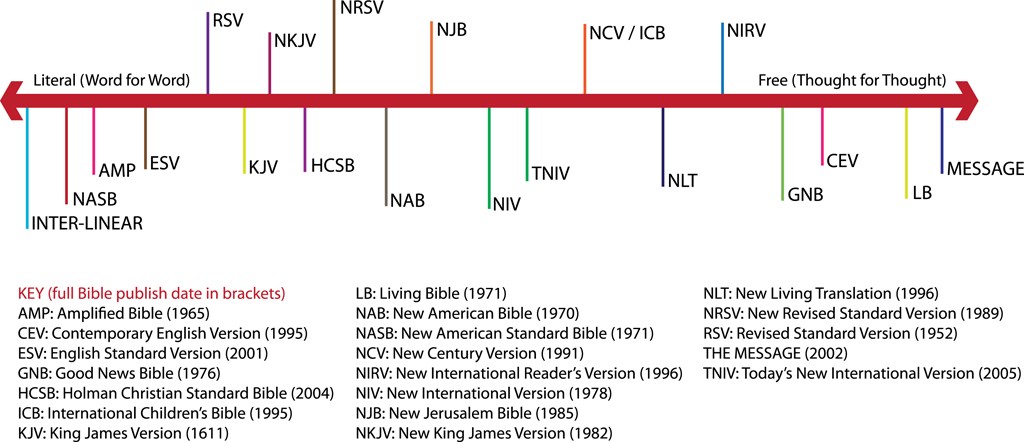Do you use the King James Version?
Introduction. If you are asking about an "official" version our congregation uses exclusively, the answer would be no. Individual members tend to use a number of translations, although they trend toward the "word-for-word" end of the spectrum (explained below). Personally, I use the King James Version, the New American Standard version, and occasionally others, including the Amplified Bible.
Today's Challenge. We have such a large number of English translations today that choosing one can be quite a challenge, especially considering the different approaches used by the translators. These approaches span a spectrum between a more literal "word-for-word" rendering and a more paraphrased "thought-for-thought" rendering. Below I've included a typical Internet graphic that illustrates this. Although those on the left, more literal side can be more challenging to read, they tend to be more accurate, which is of the upmost importance when dealing with God's word.
Today's Challenge. We have such a large number of English translations today that choosing one can be quite a challenge, especially considering the different approaches used by the translators. These approaches span a spectrum between a more literal "word-for-word" rendering and a more paraphrased "thought-for-thought" rendering. Below I've included a typical Internet graphic that illustrates this. Although those on the left, more literal side can be more challenging to read, they tend to be more accurate, which is of the upmost importance when dealing with God's word.
Watch Out for Bias. A number of Bibles reflect a certain bias on the part of the translators. There certainly are an increasing number that take liberties with the underlying ancient languages (e.g., Hebrew, Greek). Some translations are better than others at providing the English meaning of the underlying Greek text while others are not worth the paper they are written on, being riddled with doctrinal errors, bias, and false teaching (e.g., the Jehovah’s Witnesses’ New World Translation). While the original writers were Spirit-led, translators were not, even those in 1611. That is why I believe it is not correct to say (as some do) that God gave us the King James Version and it is the only translation Christians are to use.
Some "Better" Translations. It is my understanding that the American Standard is one of the more preferred when it comes to general accuracy in a word-for-word type of translation. It is somewhat hard to find in printed form if that is your preference, although it easily can be found in electronic form on the Internet. As a alternative, the New American Standard as its successor is fairly accurate and is available in printed form. The King James coupled with the New King James combines a sense of both the Received Text group of manuscripts and the Westcott/Hort text (you can find articles on the ancient manuscripts available to translators in our topical index under "B" for "Bible Origins"). Since New Testament Greek has many more verb tenses than modern English, some translations struggle to be accurate in this area. But, the Amplified Bible happens to be a good work in this area.
Conclusion. Since no translation is “perfect”, using a couple of different translations is a good study technique. In fact, you can get Bible study aids (both printed and on-line) that are multiple translations in “parallel” verse by verse.
Some "Better" Translations. It is my understanding that the American Standard is one of the more preferred when it comes to general accuracy in a word-for-word type of translation. It is somewhat hard to find in printed form if that is your preference, although it easily can be found in electronic form on the Internet. As a alternative, the New American Standard as its successor is fairly accurate and is available in printed form. The King James coupled with the New King James combines a sense of both the Received Text group of manuscripts and the Westcott/Hort text (you can find articles on the ancient manuscripts available to translators in our topical index under "B" for "Bible Origins"). Since New Testament Greek has many more verb tenses than modern English, some translations struggle to be accurate in this area. But, the Amplified Bible happens to be a good work in this area.
Conclusion. Since no translation is “perfect”, using a couple of different translations is a good study technique. In fact, you can get Bible study aids (both printed and on-line) that are multiple translations in “parallel” verse by verse.

